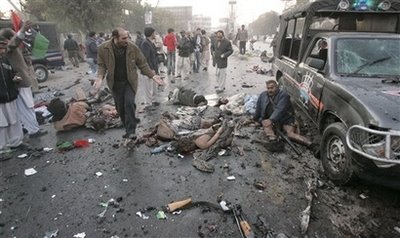|
|
|
Aftermath of the Bhutto assassination in Rawalpindi. AP photo. |
Benazir Bhutto, the leader of the Pakistani People’s Party, has been assassinated while campaigning in the military garrison city of Rawalpindi. Bhutto, who was a favorite to be the next Prime Minister of Pakistan, was killed along with at least 20 of her supporters and security detail in a shooting attack and suicide bombing as she was exiting the campaign procession in her vehicle.
The first accounts of the assassination indicate the shooter and the suicide bomber were the same person. “Party supporter Chaudry Mohammed Nazir said that two gunshots rang out when Bhutto’s vehicle pulled into the main street and then there was a big blast next to her car,” The AP reported. “The man first fired at Bhutto’s vehicle,” Rawalpindi police officer Mohammad Shahid told Reuters. “She ducked and then he blew himself up.”
Bhutto was taken to Rawalpindi General Hospital and was treated for “serious head injuries besides bullet injuries in the neck region,” Safdar Abbasi, Bhutto’s aide said. She was reported shot in the neck and chest, but Interior Ministry spokesman Javed Cheema said, “It may have been pellets packed into the suicide bomber’s vest that hit her.”
The mode of attack suggests a level of training, discipline, and expertise of a military organization. If bullets penetrated Bhutto’s vehicle windshield, which was no doubt bullet proof, the shooter was using armor-piercing rounds and had good aim. There is the possibility a sniper was placed elsewhere and aided the assault, although this has not been confirmed. The shooter also had the discipline to detonate his suicide vest after the confusion of firing into her vehicle.
Today’s attack occurred in the military garrison city of Rawalpindi, which the Pakistani military presumably controls. This was the fifth bombing targeting military and political leaders in Rawalpindi since July.
This was the second strike against Bhutto since her return to Pakistan in mid-October. The first attack also showed a level of sophistication, training, and discipline of a military operation. In the October attack on Bhutto’s return processional in Karachi, snipers, suicide bombers, and a car bomb were coordinated among a blanket of security. The attack came close to killing Bhutto. More than 132 Pakistanis were killed and upwards of 500 wounded.
Bhutto supporters have begun to blame President Pervez Musharraf for her death. The sophistication of the attack, the government’s reported refusal to provide adequate security, and the location of the bombing have created distrust among Bhutto supporters.
But this attack was most likely carried out by the Taliban and al Qaeda. Baitullah Mehsud, the leader of the newly united Movement of the Taliban in Pakistan, or Tehrik-i-Taliban Pakistan, threatened to kill Bhutto upon her return in October. The Taliban and al Qaeda manage training camps in Pakistan’s tribal areas and have trainers and recruits from the Pakistani military in their ranks.
“My men will welcome Bhutto on her return,” Baitullah told a former senator. “We don’t accept President General Musharraf and Benazir Bhutto because they only protect the US interest and see things through its glasses. They’re only acceptable if they wear the Pakistani glasses.”
Mustafa Abu al Yazid, al Qaeda’s commander in Afghanistan, has taken credit for Bhutto’s assassination. “We terminated the most precious American asset which vowed to defeat [the] mujahadeen,” Yazid told Syed Saleem Shahzad, a Pakistani reporter. The attack was reportedly ordered by Ayman al Zawahiri, al Qaeda’s second in command, and carried out by a “defunct Lashkar-i-Jhangvi’s Punjabi volunteer.”
Bhutto was believed to be the frontrunner as the next Prime Minister of Pakistan. She returned to Pakistan after the US applied significant pressure on the Musharraf government. Bhutto promised to rid the tribal regions of the Taliban and al Qaeda. Elections are to be held on January 8, 2007.










5 Comments
This is pretty bad news. There’s reports of rioting in Peshawar that I saw on Drudge. The response by the Pakistani people and Musharraf’s government in the aftermath will be crucial to world politics, and I’m thinking it’s going to have to some pretty huge ramifications.
ADNI Kronos has AQ claiming responsibility.
OT: reports of unamed senior leader in Iraq circulating as well this morn.
If AQ was smart, they would have claimed that Mussharef did it…
The best coverage of this situation is coming from NDTV an English News channel from India
http://www.ndtv.com
They are giving a live broadcast
http://www.ndtv.com/convergence/ndtv/videopod/default.aspx?id=0
When I wrote that Pakistan was in a bad way, I did not expect this
When I wrote this, I did not expect Benazir Bhutto to be shot to death. NPR has almost panoramic (and bordering on hagiographic) coverage here.
Unfortunately, in such situations misery loves comedy, or comedic fatuousness by repoters. On particularly …